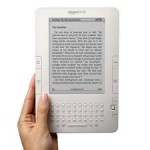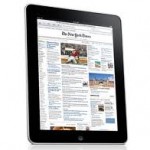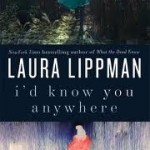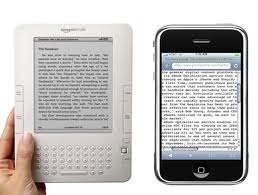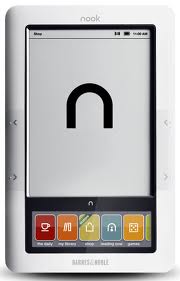(NOTE: If you haven’t yet heard about the contest I’m running through September 24th, go here to see the entry details, as well as the 50+ different prizes, and please think about entering. After all, there’s no limit on number of entries and there are many ways to enter. If you’ve already entered, remember that leaving a comment about this interview earns you yet another entry!)
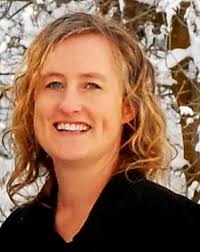
I’ll have to admit up front that this was my toughest interview. Why? Because Cindy doesn’t have anything about herself on her blog. Either she’s old-fashioned and doesn’t believe in bragging . . . or . . . she’s just too busy. Personally, I think it’s more the latter, topped off with a touch of humility. Anyway, I had to research other interviews to even get an idea of what makes this terrific indie writer tick. She’s definitely into suspense and, as you know, I LOVE suspense! (Why do you think I have a whole article about it in my menu?) Let’s stop the suspense for now and get to know her a little better, shall we?
Me: You and I have something in common besides writing. As children, we both wanted to be archaeologists. I had to pick up a lot of dried sheep droppings before I found something of value on a tel outside Baghdad. How about you? Did you ever find anything ancient? And has your interest in history carried over into your writing?
Cindy: I used to dig in my parents’ back yard and found a ton of stuff buried under the old pine trees: bottle caps, bottles, keys, unknown metal objects, bags that used to have the family pet in them (not ours, luckily) and bottle openers. Once I even found some money. I cherished all my treasures and made up stories about the people that lost them. I did find some animal bones a couple of times, but never found out what animal they came from. The hunt for something more is all over in my writing. Discovery always plays a role. One day, I will be writing a suspense novel with archaeology in it for sure.
Me: I get the idea you’ve traveled a lot. Tell us about your most favorite and least favorite vacations.
Cindy: You might think I’d say my adventures to Europe, but actually, my favorite vacation ever was in the good old USA. My hubby and I stayed in Tuscon at the Sheraton Conquistador resort. (Me: Nice!) It was more than amazing. I could walk straight out to the pool from our room and order whatever I liked poolside. I read and read and read.
(Heaven!!!)
The worst was a trip to New York. We planned to go for a day (My husband loves to do that), so we caught the red eye. Unfortunately, I can’t sleep on planes. My husband snores away. We went to a fun café, T-bones, for breakfast and then explored the city. I was so tired and beat by the time we flew home that I got totally sick on the plane and barfed all over in the bathroom. That was the worst.
(I can only imagine. Three days in NYC wore me out.)
Me: You’ve lived in the southeast and the northwest. What are the biggest differences between the two areas, and where do you tend to set your stories?
Cindy: The south is muggy and hot and outdoor activities are brutal. In the summer it’s too hot and in the winter it’s too cold. It’s a cold and a heat that goes right through you. Not my favorite place because I love the outdoors. There are too many awful bugs there, too.
I loved Oregon but in the end, I need four seasons and Utah is the place for that.
A novel I’m working on right now is set in the south and the first book in my new series is set in Oregon. The second book in this new series is set right here in Utah. I also have plans for one in New York and one in Germany. So many stories to tell and so little time.
(I knew she had the travel bug! Even in fiction. Here’s a look at the first in her “Watched” series, which is being offered as a prize for my contest:)
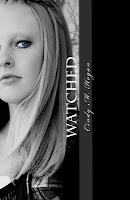
Me: What would be the top three books on your Suspense list (besides your own)?
Cindy: Crud. I hate this question. (Me: Oops, sorry.) I read so many books, it’s hard to pick favorites. I did just listen to THE REMBRANDT AFFAIR by Daniel Silva and really liked that.
(Hmm. I’ll have to check that out.)
Me: Is your life as fast-paced as your fiction and why or why not?
Cindy: This past year has been a whirlwind for sure. I’ve always had my hands in multiple things at one time. I don’t slow down often, but sometimes I have to. I like to be busy. I start my day at five and end it around eleven. There’s no time for TV or playing around these days. I’m either writing, reading, or critiquing.
Me: Please describe your writing space (and provide a picture, if possible).
Cindy: My writing space is perfect for me. I’m surrounded by windows so there’s no chance of claustrophobia setting in.
(We got lucky. She provided two pictures. The first, I suppose, as her desk looks before she sits down, and the second after she’s turned on her computer. Am I the only one curious about what is in that glass dish to the right of the monitor? It looks like bags of something.)
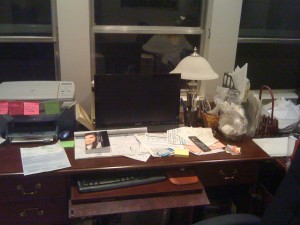
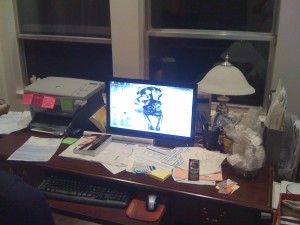
Me: What exactly is in your big writing bag and why does your husband hate it? (I’d love a picture of that, too.)
Cindy: Everything is in my writing bag. You’d be surprised at what I can stuff in there. Feel privileged, not everyone gets a sneak peek. :D
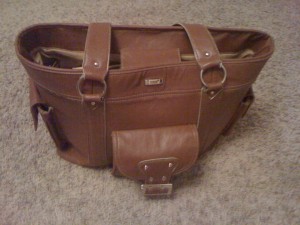
My husband hates it because it is so darn huge.
Chapstick, pens, pencils, notebooks, loose paper, stapler, tissues, meds, gum, laptop, Nook, ward calling list, 2 calendar books, newsletter sign-up, sunglasses, lotion, sanitizer, bookmarks, sunscreen, iPod, headphones, digital recorder, jump drives, band-aids, mirror, glue stick, sticky notes, cell phone, keys, wallet, pictures, folders, and other miscellaneous spy items that if I disclosed would put us all in danger.
(Okay, then. But glue stick, really?)
Me: Finally, what are the most important characteristics for writers who want to be successful going the indie route like you?
Cindy: Hard-working, friendly, curious, and flexible.
And there you have it. The keys to success in indie publishing.
(I should have asked her what kind of daily exercise regimen she goes through to keep strong enough to carry around that bag. No wonder she got sick in NYC! Can you imagine what the TSA people thought of that bag when they screened it at the airport?)
Originally posted 2012-09-12 06:00:28.

